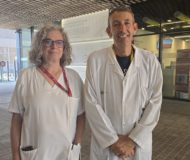

Dr. Antoni Betbesé-Roig, a researcher from the Intensive Care Medicine Group at the Sant Pau Research Institute (IR) and a professional from the Intensive Care Medicine Service at Hospital Sant Pau, and Dr. Mercedes Camacho, from the Complex Disease Genomics Group at IR, have participated in a study led by Hospital Universitari de Bellvitge and IDIBELL, which has just been published in the Journal of the American Medical Association (JAMA). The results show that the use of a new extracorporeal blood purification membrane significantly reduces acute kidney injury after high-complexity cardiac surgery.
Acute kidney injury is a condition in which the kidneys suddenly stop functioning and cannot remove toxins from the blood, a common issue in critically ill patients or those undergoing high-complexity cardiac surgeries. This has driven research into procedures that may help address this problem, leading to the SIRAKI02 study. Researchers from Hospital Universitari Germans Trias i Pujol also participated in this study.
The aim of the study was to assess whether using an enhanced adsorption membrane, known as oXiris®, during cardiac surgery could reduce the incidence of kidney injury in patients requiring extracorporeal circulation. This membrane is already used in intensive care units for sepsis treatment and continuous renal replacement, but this is the first time it has been associated with positive clinical outcomes in the context of cardiac surgery.
The trial included 343 patients from Bellvitge and Germans Trias i Pujol hospitals who underwent surgeries between 2016 and 2022, requiring extracorporeal circulation for more than 90 minutes. The inflammatory response of the patients was measured through indicators obtained before and after the procedure, in collaboration with the Biochemistry Laboratory at Hospital Sant Pau.
The results show that, in the control group (169 patients), 40% developed acute kidney injury in the week following surgery, while in the group treated with the new membrane (174 patients), this percentage dropped to 28%. Furthermore, no additional complications were detected from using the device, and perfusionists reported that it was simple and efficient to operate.
If these results are confirmed in larger studies, this device could become a routine part of treatment for high-risk patients undergoing cardiac surgery with extracorporeal circulation, with the potential to reduce ICU stay time and offer other clinical benefits.
Pérez-Fernández, X. et al. (2024) “Extracorporeal blood purification and acute kidney injury in cardiac surgery: The SIRAKI02 randomized clinical trial”, JAMA: the journal of the American Medical Association [Preprint]. Available at: https://doi.org/10.1001/jama.2024.20630